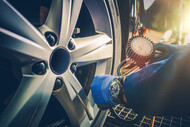
Learn
The Tire Doctor will see you now. If you notice a problem with one of your tires, we can diagnose it here. Which of the following best describes the problem?
Uneven Wear
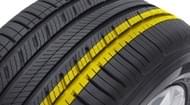
Poor Alignment
You need an alignment when you notice:
- Uneven front or rear tire wear
- Generates excessive heat, which reduces tire durability and can lead to tire failure.
- Changes in your vehicle's handling or steering response (e.g., pulling to one side)
Solution:
Many vehicles today are equipped with rear suspensions that can be adjusted for alignment. If this is the case, your vehicle may need a "front end" alignment or a "four wheel" alignment, depending on the symptoms you are experiencing. See your local authorized Michelin tire dealer for service and inspection.
If your tire continues to lose pressure, visit your local authorized Michelin tire dealer.
Soft Tires
A tire is called soft when it doesn’t have sufficient air pressure to meet the vehicle manufacturer’s recommended psi (pressure per square inch). Soft tires lead to flats and tire blowouts.
Underinflation:
- Reduces tread life through increased treadwear on the outside edges (or shoulders) of the tire.
- Generates excessive heat, which reduces tire durability and can lead to tire failure.
- Reduces fuel economy through increased rolling resistance (soft tires make your vehicle work harder).
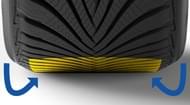
Solution:
Add air to your tire until it reaches the proper air pressure (psi, as measured by an air pressure gauge). To find the proper air pressure, consult your vehicle’s owner’s manual or find your recommended psi on the sticker on your door jamb. (Here's how.)
If your tire continues to lose pressure, visit your local authorized Michelin tire dealer.
Flat
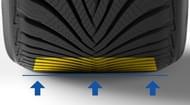
Damage That Requires Repair
Most punctures, nail holes or cuts up to ¼" confined to the tread may be satisfactorily repaired by trained personnel using industry-approved procedures.
Worn-Out Tire Issues:
Most punctures, nail holes or cuts up to 6 mm (¼") confined to the tread may be satisfactorily repaired by trained personnel using industry-approved procedures.
Solution:
Change your flat tire out with your spare tire. Then visit an authorized Michelin tire dealer for an inspection as soon as possible. They can then determine what damage (internally as well as externally) your tire has, and whether to repair or replace your tire.
Excessive Wear
Overinflation issues:
- On an overinflated tire, the center of the tread bears most of the load and wears out faster than the outside edges.
- To prevent overinflation, always check tires when they’re cold or before they’ve been driven.
- Or, check tires at least three hours after they have been driven.
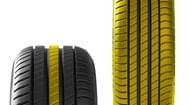
Solution:
Take air out of your tire, using a tire pressure gauge, until your air pressure reading matches your vehicle manufacturer’s recommended psi/kPa. To find the proper air pressure, consult your vehicle owner’s manual or find your recommended psi/kPa on the sticker on your door jam. (Here's how.)
Damage
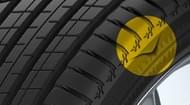
Damage That Requires Repair
Tire Damage Issues:
- Most punctures nail holes, or cuts up to ¼" confined to the tread may be repaired by trained personnel using industry-approved procedures.
- An on-the-wheel plug-only repair is not reliable and is dangerous because the inside of a tire must be inspected after a puncture.
Solution:
If your vehicle is equipped with one of the several types of temporary spares, replace your damaged tire with the spare, but be sure to first check the spare tire's sidewall for the correct inflation pressure, speed, and mileage limitations. Take your vehicle into an authorized Michelin retailer for an inspection as soon as possible.
The proper repair of a radial tire includes the placing of a rubber patch on the inner liner of the tire and a rubber filling of the hole by a professional. Do not attempt to have repaired tires with tread punctures larger than 6 mm (1/4") or any sidewall puncture. Also, do not have tires repaired that are worn below 1,6 mm (2/32") tread depth.
Wear on Both Edges
Underinflation Issues:
- Reduces tread life through increased treadwear on the outside edges (or shoulders) of the tire.
- Generates excessive heat, which reduces tire durability and can lead to tire failure.
- Reduces fuel economy through increased rolling resistance (soft tires make your vehicle work harder).
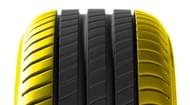
Solution:
Add air to your tire until it reaches the proper air pressure (psi, as measured by an air pressure gauge). To find the proper air pressure, consult your vehicle’s owner’s manual or find your recommended psi on the sticker on your door jamb. (Here's how.)
If your tire continues to lose pressure, visit your local authorized Michelin tire dealer.
Wear in Center

Overinflation issues:
- On an overinflated tire, the center of the tread bears most of the load and wears out faster than the outside edges.
- To prevent overinflation, always check tires when they’re cold or before they’ve been driven.
- Or, check tires at least three hours after they have been driven.
Solution:
Take air out of your tire, using a tire pressure gauge, until your air pressure reading matches your vehicle manufacturer’s recommended psi/kPa. To find the proper air pressure, consult your vehicle owner’s manual or find your recommended psi/kPa on the sticker on your door jam. (Here's how.)







